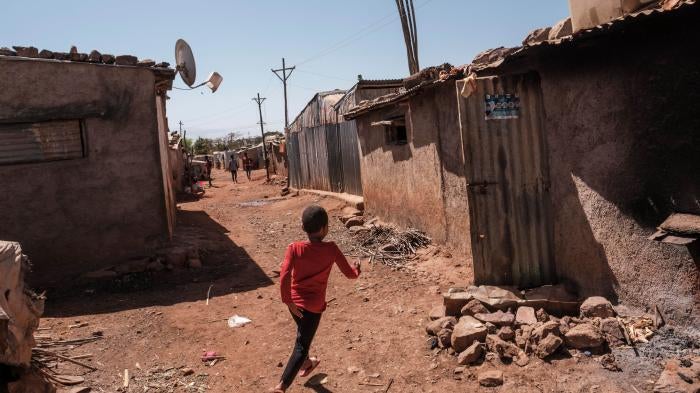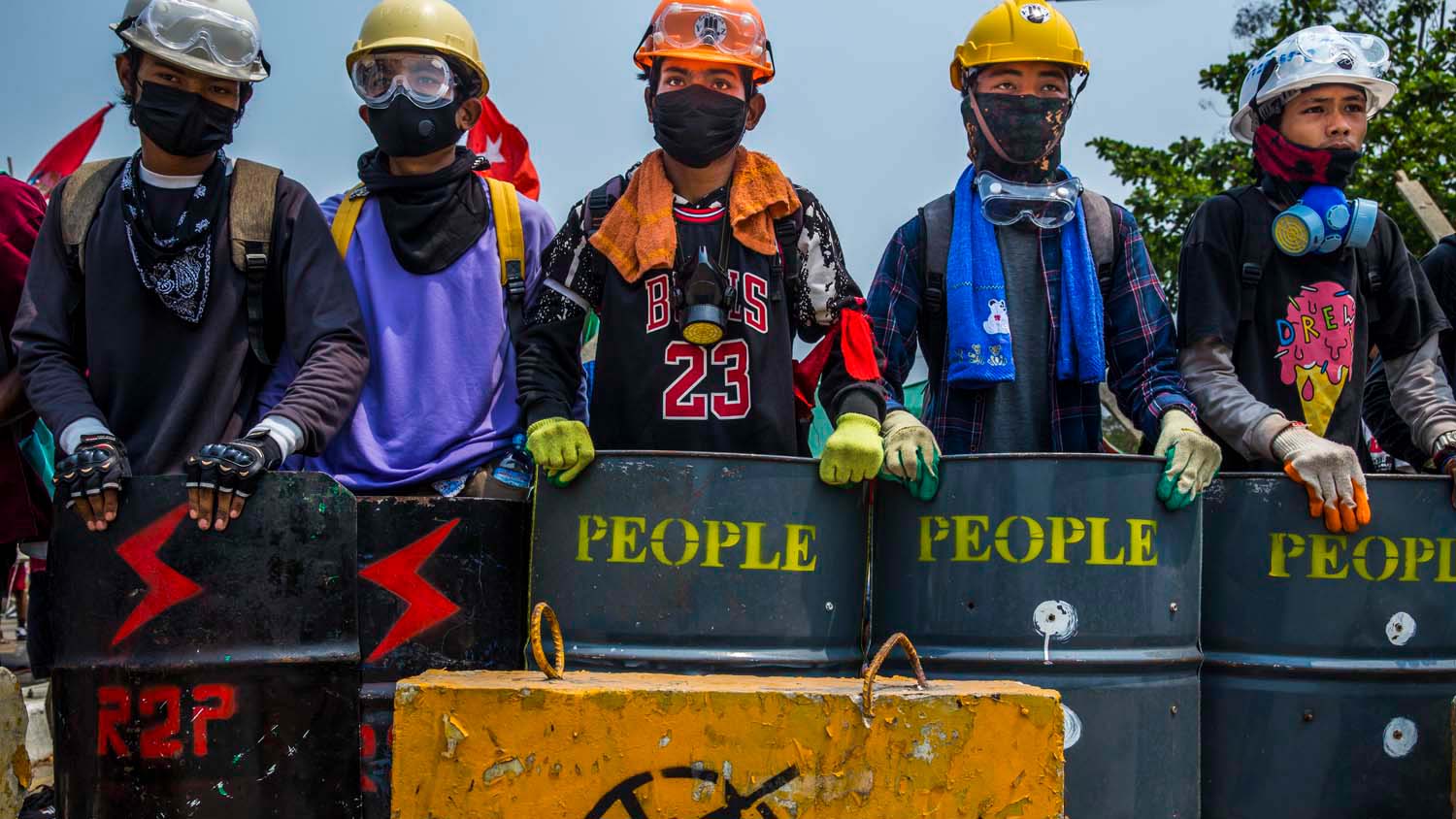Eritrean government forces committed war crimes, possible crimes against humanity, and other serious violations against Tigrayan civilians during the ongoing conflict in Ethiopia’s Tigray region. Eritrean forces also forcibly disappeared dozens of Eritrean refugees living there, raped several, coercively repatriated hundreds, and destroyed two Eritrean refugee camps. Eritrean forces also committed widespread pillaging with much of the plunder taken back to Eritrea.
At home, government repression persisted, including through forced conscription, mass roundups to fill the army’s ranks and widespread forced labor. The government also severely restricted freedom of expression, opinion, and faith.
Eritrea has been ruled by its unelected president, Isaias Afewerki, since independence in 1993, with no legislature, no independent civil society organizations, and no independent judiciary. The transitional constitution, which guarantees civil rights, has never been implemented—removing all checks on Isaias’s arbitrary rule.
September marked the 20th anniversary of the beginning of the government’s clampdown on perceived critics, including the arrest of 11 high ranking government officials and 10 journalists, and the closure of privately owned media outlets. There has been no information on the whereabouts of 20 of the 21.
War Crimes and Other Abuses in Tigray
Eritrean Defense Forces (EDF) committed widespread abuses against civilians during its involvement in the conflict in Ethiopia’s Tigray region alongside the Ethiopian National Defense Forces (ENDF) against forces aligned to the Tigray People’s Liberation Front (TPLF).
On November 9, 2020, Human Rights Watch documented artillery attacks launched from Eritrea hitting the Tigrayan town of Humera, in western Tigray. Eritrean forces have carried out large-scale massacres, summary executions, widespread sexual violence including rape, gang rape, and sexual slavery, widespread pillage, attacks on refugee camps, and destruction and pillaging of crops.
Indefinite Military Conscription and Forced Labor
Human Rights Watch received credible reports of new roundups (“giffas” in Tigrinya the most widely spoken language) to help fill the army’s ranks due to losses suffered during the war in Tigray, during which security forces reportedly block off certain areas and round up individuals perceived as being of military age or trying to evade conscription. Relatives of those forced to fight in the Tigray region did not receive official feedback on the fate of their loved ones.
A diaspora human rights organization reported that a 16-year-old boy was picked up outside his home in Eritrea’s capital, Asmara, and trained for two months in Eritrea before disappearing. His family heard about his whereabouts a month later when he was named as a prisoner of war by Tigrayan forces.
Forced conscription and deployment to the military also continued through the country’s infamous indefinite national service system. Mostly men and unmarried women were sent indefinitely into the military or civil service for low pay and with no say in their profession or work location. Conscripts are often subjected to inhuman and degrading punishment, including torture, without recourse. Conscientious objection is not recognized; it is punished. Discharge from national service is arbitrary and procedures are opaque.
For secondary students, some as young as 16, conscription begins at the Sawa military camp where students finish secondary school and undergo compulsory military training. Students are under military command, with harsh military punishments and discipline, and female students have reported sexual harassment and exploitation.
The government continued to rely on poorly trained national service teachers, which affects the quality of primary and secondary education, and teacher retention.
Unlawful, Prolonged, and Abusive Detentions
Thousands of prisoners languish in the country’s extensive prison network, held in overcrowded places of detention with inadequate food, water, and medical care. Many are held incommunicado and detained indefinitely, denied basic due process rights, without access to legal counsel, judicial review, or family visits, some for decades.
In September 2001, Eritrean authorities arrested 11 government officials who had called on Isaias to introduce political reforms and 10 prominent journalists who reported on this. Among those detained was journalist Dawit Isaak, a dual Eritrean-Swedish citizen, who was briefly released from jail in 2005, and remains in incommunicado detention. At least 10 of the 21 initially arrested are reported to have died in detention.
Other high profile detainees remain in incommunicado detention, including Ciham Ali Abdu, daughter of a former information minister, held since December 2012 when she was just 15 years old, and former finance minister and critic of the president, Berhane Abrehe, detained since September 2018. The country’s massive prison population also includes draft evaders or “deserters,” some of whom were detained while trying to flee the country, and individuals detained for their religious beliefs and practices.
The US-based Public Broadcasting Service (PBS) released a documentary in May which included footage that was reportedly recorded by a former prisoner in Abi Abeito, one of the country’s military detention facilities, offering an insight into the horrific conditions. The film shows cells that are so overcrowded that prisoners lie one on top of each other, unable to stretch out.
Freedom of Religion
For over two decades, the government has denied religious liberty to anyone whose religious affiliation does not match the four denominations that the government “recognizes:” Sunni Islam, Eritrean Orthodox, Roman Catholic, and Evangelical (Lutheran) churches. People affiliated with “unrecognized” faiths continue to be imprisoned, and torture has been used to force them to renounce their religion.
Positively, in the first two months of the year, the government released dozens of Evangelical and Orthodox Christian detainees held for their religious beliefs and practices, who had reportedly been detained for between 2 to 12 years. In addition, since late 2020, 32 Jehovah Witnesses were released, including three conscientious objectors who had been detained since 1994. Despite these releases, 20 Jehovah Witnesses are still detained, and the government continued to severely restrict religious freedoms and arrest people because of their religious practices.
Refugees
Eritrea’s ongoing rights crisis continues to drive Eritreans into exile, including children and youth escaping conscription.
For decades, Ethiopia’s northern Tigray region, just south of the border with Eritrea, had been one of the main destinations for Eritrean refugees. At the start of the conflict in November 2020, around 96,000 Eritrean refugees were registered in Tigray.
Between November, 2020 and January, 2021 Eritrean forces twice occupied Hitsats and Shimelba camps hosting Eritrean refugees in Tigray near the country’s border and subjected camp residents to enforced disappearances, rape, and coercive repatriations before destroying the camps. During these two months Eritrean forces also targeted Tigrayans living in the surrounding communities, including through killings and widespread pillaging, resulting in significant tensions between Tigrayans and the Eritrean refugee community. As of September, over 7,500 refugees from both camps remained unaccounted for.
Covid-19
Eritrea refused to join the UN-led COVAX initiative to receive Covid-19 vaccine supplies and is reportedly yet to start a vaccination campaign.
Covid-related restrictions kept schools largely closed during the first three months of the year, disrupting education for more than 600,000 students. However, the government continued to force final year high-school students to attend Sawa, where dormitories are crowded, and water supplies and health facilities limited. Students were not released from Sawa despite concerns that the virus that causes Covid-19 could easily spread in the cramped and unsanitary conditions.
Key International Actors
Media reported in February that the United Arab Emirates had begun to dismantle parts of its military base near the port of Assab. The base, established in 2015, had supported UAE’s intervention in the Yemen conflict.
In March, the European Union designated Eritrea’s national security agency, under its global human rights sanctions regime, for serious human rights abuses including killings, arbitrary arrests, enforced disappearances, and torture committed by its agents. The European Commission announced that around €1 million (US$1.1 million) funds allocated to Eritrea under the EU’s Emergency Trust Fund for Africa (EUTF) would be reallocated, citing a lack of interest on the part of Eritrea. This followed fierce criticism in 2020, including by the European Parliament, of the EU’s funding of the procurement of materials for the construction of a road in Eritrea that employed conscript forced labor.
In August, the US imposed targeted sanctions on General Filipos Woldeyohannes, the chief of staff of the Eritrean Defense Forces (EDF), for serious human rights abuses committed by the Eritrean forces in Tigray.
In September, the Biden administration issued an executive order enabling the United States to sanction individuals “responsible for, or complicit in, prolonging the conflict in Ethiopia, obstructing humanitarian access, or preventing a ceasefire.” On November 12, the U.S. Department of the Treasury’s Office of Foreign Assets Control (OFAC) designated four Eritrean entities and two individuals.
The EU, US, and African members on the UN Security Council repeatedly called on Eritrea to withdraw its troops from Ethiopia. repeatedly called on Eritrea to withdraw its troops from Ethiopia.


